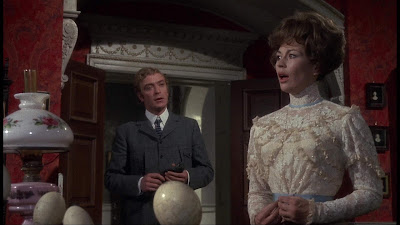The Wrong Box* (Bryan Forbes, 1966) Bryan Forbes is a British director not known for a light touch, nor as a writer (and—in the few instances I saw him, not as an actor, either!). So to see him in charge of a comedy leaves one a bit nonplussed as opposed to amused (which should be the bloody intention!). The same can be said for this film, which tries very, very...veddy... hard to be funny, but ends up evoking feelings of something akin to pity (which just won't "do" for a comedy, much as Chaplin liked to use it in his bag of tricks).
The story of a tontine—a trust created for a clutch of privileged school-boys that will go to the last man standing (and the controversies that ensue—The Wrong Box should have the same breakaway, mean-spirited greediness of, say, It's a Mad, Mad, Mad, Mad World (And one should say that with Stanley Kramer, you wouldn't think of being able to do a comedy, either, but look at that result!), Those Magnificent Men in Their Flying Machines, or The Great Race, but instead has a leaden lethargy sometimes punctuated by awkward transitions, ill-timed (and rather unnecessary) close-ups, and the frequent appearance of title cards (to explain something the direction does not adequately provide) in a black-out format that recalls silent movie transitions. However, they come in at souch odd times, they're more interruptions that transitons (Odd that one can even mis-time interstitials!)It's Bryan Forbes imitating Richard Lester making an Ealing Comedy, but without Alec Guiness, and as slap-dash as the Lester's direction could be at times, he at least could tell a story, and give it the momentum so it would never flag or falter. As it is it's one of those 95 minute movies that seem to last forever.
Great cast, though: Michael Caine, Peter Cook and Dudley Moore, John Mills and Ralph Richardson; Peter Sellers has an extended cameo as a fraudulent doctor that starts slowly but finally picks up a weird head of steam. And there's an odd love story between Caine and Forbes' actress-wife Nanette Newman that seems unconvincing. The screenplay is by Larry Gelbart and Burt Shevelove, who wrote the book for the Broadway musical "A Funny Thing Happened on the Way to the Forum" (Lester's film of which was released the same year—coincidence?) John Barry's galumphing score works overtime to make it frothy, but this is one granite souffle. What is missing is whimsy, rather than desperate manicness, and it fortunately is found in Sellers' work, and in the odd performance of Wilfrid Lawson as the harried (not that you'd know) butler, Peacock.The story of a tontine—a trust created for a clutch of privileged school-boys that will go to the last man standing (and the controversies that ensue—The Wrong Box should have the same breakaway, mean-spirited greediness of, say, It's a Mad, Mad, Mad, Mad World (And one should say that with Stanley Kramer, you wouldn't think of being able to do a comedy, either, but look at that result!), Those Magnificent Men in Their Flying Machines, or The Great Race, but instead has a leaden lethargy sometimes punctuated by awkward transitions, ill-timed (and rather unnecessary) close-ups, and the frequent appearance of title cards (to explain something the direction does not adequately provide) in a black-out format that recalls silent movie transitions. However, they come in at souch odd times, they're more interruptions that transitons (Odd that one can even mis-time interstitials!)It's Bryan Forbes imitating Richard Lester making an Ealing Comedy, but without Alec Guiness, and as slap-dash as the Lester's direction could be at times, he at least could tell a story, and give it the momentum so it would never flag or falter. As it is it's one of those 95 minute movies that seem to last forever.
John Barry's ultra-light waltz is lovely but at odds with the material.
* The asterisk is used so that it isn't confused with the silent version of Robert Louis Stevenson's novel (with Lloyd Osbordone i913—not that a lot of people have seen it.





























